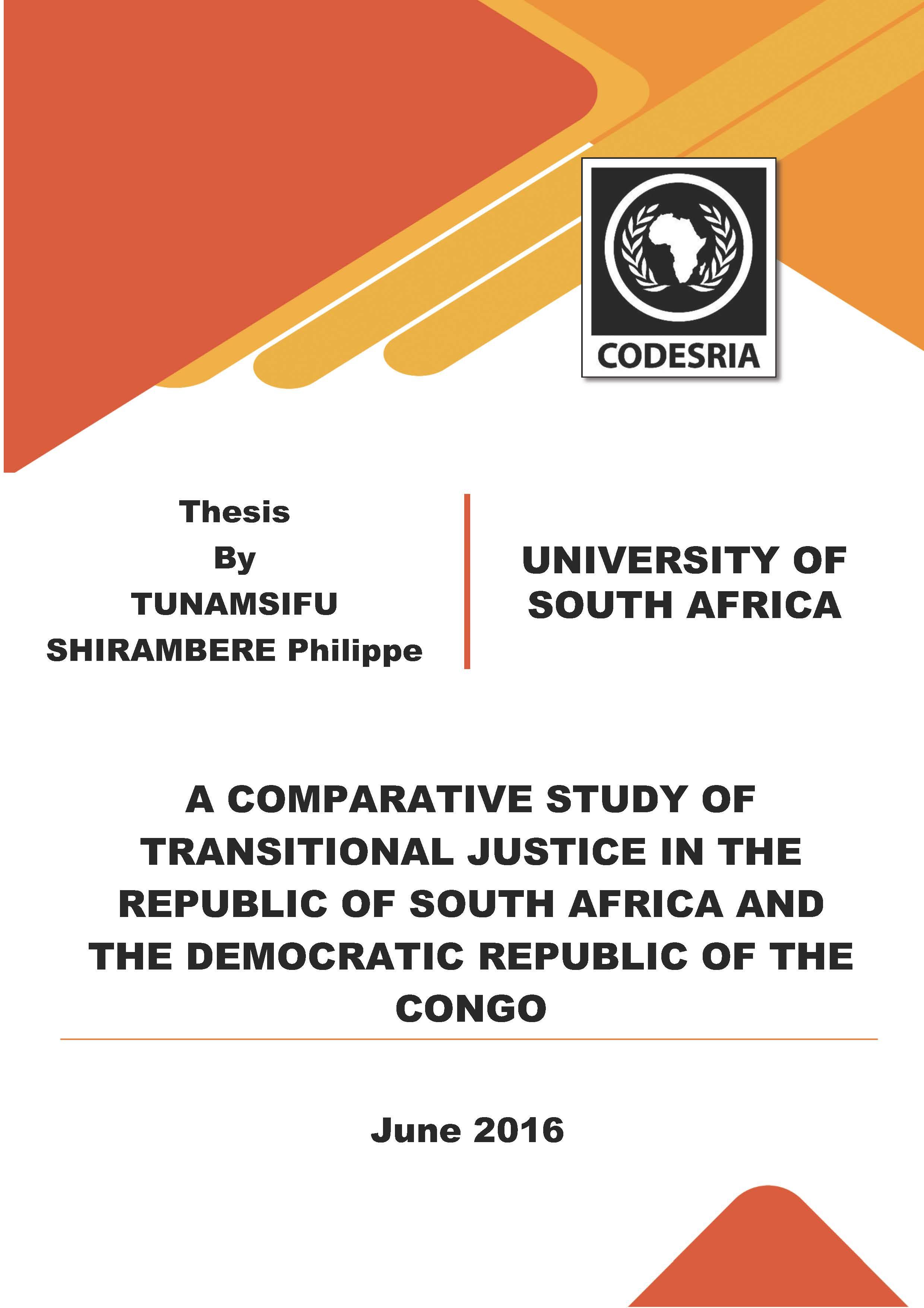A COMPARATIVE STUDY OF TRANSITIONAL JUSTICE IN THE REPUBLIC OF SOUTH AFRICA AND THE DEMOCRATIC REPUBLIC OF THE CONGO
Keywords:
Amnesty, apartheid, complementarity, International Humanitarian Law, prosecution, Truth and Reconciliation Commission.Synopsis
This study compares the transitional justice mechanisms adopted in the RSA with similar mechanisms adopted in the DRC. The main goal is to make a scholarly contribution to the existing body of knowledge by analysing the role played by criminal prosecutions and the TRC in both countries. The study relied on legislation, literature and empirical fieldwork as its sources of information. To collect data, 50 key informants were interviewed and three focus group discussions were held.
Findings reveal that during the political transition in the RSA, the legal order was not reformed, and the judiciary used the threat of prosecution to compel perpetrators to make full disclosure of their activities in exchange for amnesty. Although the TRC recommended the prosecution of those who refused to testify, it is remarkable that none of the high profile cases was prosecuted. However, the political leadership supported the TRC to ensure that reconciliation efforts were prioritised. In the DRC on the other hand, little reform was made in the judicial sector, and though few cases were prosecuted, alleged perpetrators who had been integrated into public institutions were not prosecuted. Under the complementarity principle, the
ICC helped to prosecute a handful of the thousands of perpetrators. Due to fragile peace, insufficient funds, and lack of political will, the TRC in the DRC failed to investigate a single case.
The study recommends that in order to restore victims’ dignity in the RSA, the State needs to fulfil its obligation to implement the TRC’s recommendations especially the obligation to grant reparations and to prosecute anyone who failed to apply for amnesty or who was denied amnesty. If the State continues to neglect this obligation, the SACTJ should consider holding the
government accountable or submitting cases to a neutral country which subscribes to the principle of universal jurisdiction. In the cases about the remains of missing persons, it is suggested that the SACTJ should continue its dialogues but involve elders from different South African communities in order to encourage those with information about such cases to disclose it.
In the case of the DRC, the importance of restoring peace and the State’s authority is stressed. Considering the regional dimension of the conflicts, the study also calls for a regional rather than a national approach to handling the cases that would see to the creation of a Great Lakes Regional Court and a Great Lakes Regional TRC. If this call is not taken seriously, the civil society organisations from the ICGLR Member States could consider organising a roundtable talk from which an unofficial regional Commission of Inquiry that would investigate the crimes committed in the DRC would emanate. The final report of the Commission should then be submitted to the different parliaments of affected countries, to the ICGLR’s Executive Secretary, to the AU’s Chairperson and to the UN Secretary General.
Downloads
References
Vanspauwen and Savage “Truth-seeking in the DR Congo”
Vanspauwen K and Savage T “Restorative Justice and Truth-seeking in the DR Congo:
Much Closing for Peace, Little Opening for Justice” in Aertsen I et al (eds) Restoring
Justice After Large-Scale Violent Conflicts: Kosovo, DR Congo and the Israeli-
Palestinian Case (Willan Publishing USA 2008) 392-410
Verbeeck “Revenge or Reconciliation?”
Verbeeck G “The South African Model of Transitional Justice: Revenge or Reconciliation?” in Nelen H and Claessen J (eds) Beyond the Death Penalty: Reflections on Punishment (Intersentia Cambridge 2012) 203-218
Verdoolaege “The Debate on Truth and Reconciliation”
Verdoolaege A “The Debate on Truth and Reconciliation: A Survey of Literature on the South Africa Truth and Reconciliation” in Anthonissen C and Blommaert J (eds) Discourse and Human Rights Violations (John Benjamins Publishing Company Amsterdam 2008) 13-32
Walker “Restorative Justice”
Walker L “Restorative Justice: Definition and Purpose” in Van Wormer KS et al (eds) Restorative Justice Today: Practical Applications (Sage Los Angeles 2013) 3-13 Warta, Alberda and Verweij “Effectiveness of Penal Interventions” Warta B, Alberda D and Verweij S ”Recidivism in the Netherlands: Dutch Research on the Effectiveness of Penal Interventions” in Nelen H and Claessen J (eds) Beyond the Death Penalty: Reflections on Punishment (Intersentia Cambridge 2012) 305-317 White “Pro Tanto Retributivism”
White MD “Pro Tanto Retributivism: Judgment and the Balance of Principles in Criminal Justice” in Retributivism: Essays on Theory and Policy (Oxford University Press New York 2011)129-145
Wiebelhaus-Brahm “Truth Commissions”
Wiebelhaus-Brahm “Truth Commissions and Other Investigative Bodies” in Bassiouni MC (ed) The Pursuit of International Criminal Justice: A World Study on Conflicts, Victimization, and Post-conflict Justice Vol 1 (Intersentia Antwerp 2010) 477-574






